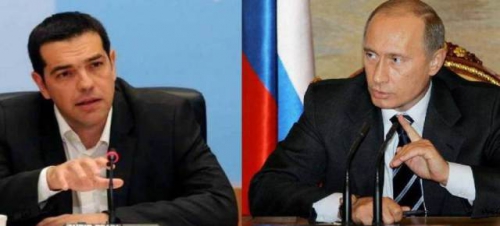vendredi, 30 janvier 2015
Tsipras blasts EU's Ukraine policy in Moscow

Tsipras blasts EU's Ukraine policy in Moscow
Syriza leader supports 'referendums' in Ukraine
Distancing himself from the international recognition of Ukraine's government by the EU, the US and the UN, Tsipras rejects the legitimacy of the interim government on the grounds that fascist elements are serving in it
Syriza's leader Alexis Tsipras meets Valentina Matviyenko, who chairs Russia's upper house Syriza leader Alexis Tsipras lambasted western policy on Ukraine and expressed support for separatist referendums in the Ukraine during an official visit to Moscow, upon the invitation of the Russian government.
"We believe the Ukrainian people should be sovereign and should decide with a democratic manner and with referendums on its future," Tsipras said, as quoted by the state-run Athens News Agency, of the breakaway referendums that are leading to the country's partition.
A Syriza party source told EnetEnglish that Tsipras has repeatedly said that whatever happens in Ukraine must be in line with international law, and that the support for referendums refers only to a possible federalisation of Ukraine. But that clarification was absent from yesterday's remarks.
While Tsipras said he was visiting Russia in his dual capacity as Greek main opposition leader and the European Left party's candidate for the presidency of the European Commission, it is unclear whether the pro-secessionist stance is the official policy of the European Left.
Distancing himself from the international recognition of Ukraine's government by the EU, the US and the UN, Tsipras clearly rejected the legitimacy of the interim government on the grounds that fascist elements are serving in it.
"It is a regression for us to see fascism and the neonazis entering European governments again and for this to be accepted by the EU," Tsipras stressed.
Filling out his complete rejection of the international community's handling of the Ukraine crisis, Tsipras denounced international sanctions against Moscow, which he said will "only harm Europe". He added that the EU "is shooting itself in the foot with this strategy, and we ask for there not to be any military operation or activity and for there to begin a dialogue and diplomacy toward finding a solution".
But he also maintained that Ukraine must become a bridge between the EU and Russia, and not an area of division.
Tsipras and his delegation stressed that Russia is an integral part of Europe, which stretches "from the Atlantic to the Urals". Greece and Russia, he said, are linked with a "tradition of common struggles of our peoples, common religious convictions, with common political and cultural roots in our history."
His contacts in Moscow included talks with Valentina Matviyenko, who chairs Russia's upper house of parliament and is a close associate of President Vladimir Putin. She had also served as Russian ambassador to Athens.
Energy
Matviyenko expressed hopes for closer ties with Athens, in the areas of economy and energy primarily.
"Greece views Russia as a strategic partner and we are interested in developing ties, in various sectors and directions, both bilateral and multilateral, including parliamentary exchanges," said Matviyenko, who also bemoaned the fact that Greek Parliament Speaker Evangelos Meimarakis has yet to accept her invitation to pay an official visit to Moscow.
Taking a jab at the west's sanctions on Moscow, she also expressed regret over the fact that she cannot visit Greece, because she is on a list of Russian officials barred from EU entry.
For years, many Greek foreign policy analysts have argued that closer ties with Russia should be part of a multipronged Greek foreign policy, but relations have chilled in the last four years of the Greek economic crisis, and particularly after the 2009 Greek elections that brought George Papandreou to power.
Papandreou departed sharply from the policy of his predecessor, Kostas Karamanlis, who had pursued much closer cooperation with Moscow, especially in the area of energy. That departure included an abandonment of the Burgas-Alexandroupoli and the South Stream pipelines. The latter, especially, had evoked the ire of Greece's EU and US partners.
When Papandreou visited Moscow before Athens in 2010 accepted its bailout mechanism and memorandum, Putin advised him to go to the IMF for funding.
While the last two years of Prime Minister Samaras' administration have been marked by a decided distance from Moscow, in February Greece's gas distributor Depa was able to close a deal with Gazprom for a 15% reduction in gas rates, effective retroactively, from July 2013.
That development came a month after Samaras' official talks with Putin, in January, before the outbreak of the Ukraine crisis, which served to break the ice somewhat between the two sides.
"Naturally, we are aware of the difficulties that Greece is facing, but I will note that our trade grew by 16% last year. Naturally, we are also impressed with the results in the tourism sector: 1.2 million Russians visited Greece in 2013. We have some investment projects as well," Putin said at the time.
00:04 Publié dans Actualité, Affaires européennes, Géopolitique | Lien permanent | Commentaires (0) | Tags : grèce, russie, europe, affaires européennes, géopolitique, politique internationale, ukraine |  |
|  del.icio.us |
del.icio.us |  |
|  Digg |
Digg | ![]() Facebook
Facebook




Les commentaires sont fermés.